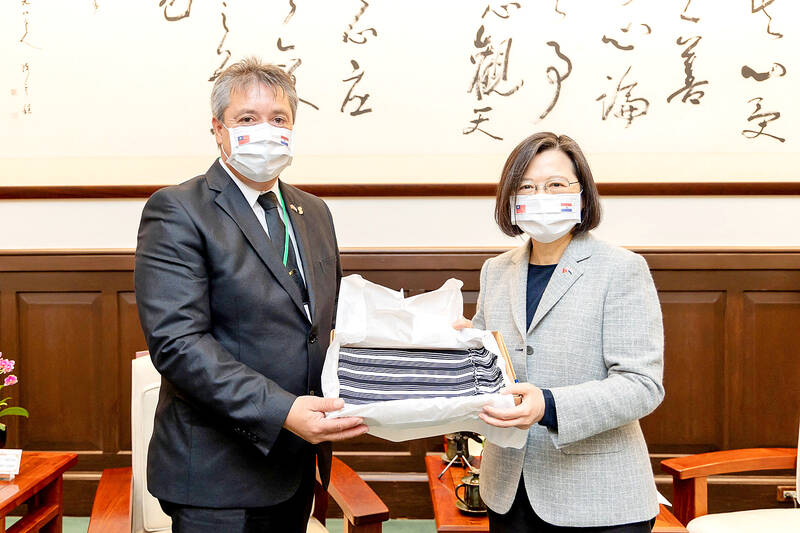President Tsai Ing-wen (蔡英文) yesterday discussed the need to jointly defend democracy against authoritarianism as she sought to shore up shaky ties with Paraguay, saying that the two nations are good friends.
Paraguay is one of only 14 countries to have formal diplomatic relations with Taiwan, as Beijing steps up efforts to entice Taipei’s allies to switch sides.
The South American nation would cut diplomatic ties with Taiwan and open relations with China if the opposition wins an election in April, Paraguayan presidential candidate Efrain Alegre told Reuters, hoping to boost economically important soy and beef exports.

Photo: Reuters
A cross-party delegation of Paraguayan lawmakers led by Paraguayan Chamber of Deputies President Carlos Maria Lopez met Tsai at the Presidential Office in Taipei yesterday.
Tsai said that the “deep friendship” between Taiwan and Paraguay was shown during her visit to the country in 2016.
Cooperation between the two nations is excellent, while trade relations are improving, she said, describing all members of the delegation as good friends of Taiwan.
“I would like to emphasize again that in the face of the continued expansion of authoritarianism, we allies on the democratic front must strengthen cooperation to jointly protect our way of life,” Tsai said.
Both Lopez and Alegre are members of the Authentic Radical Liberal Party.
In his address, Lopez thanked Taiwan for arranging the delegation’s visit, which included lawmakers from ruling and opposition parties.
Paraguay and Taiwan have maintained official diplomatic relations for more than 65 years, he said, adding that the shared friendship and democratic values have bonded the allies despite the geographical distance between them.
He expressed gratitude on behalf of his government for scholarships Taiwan has granted to Paraguayan students to study in Taiwan, among other assistance.
Lopez said the delegation’s visit shows that democracies are able to respect each other and the decisions of their voters.
He said he hopes that the two sides’ long-term diplomatic ties can be bolstered, while calling on voters to support the relations so that the two countries can work closely in the international community.
Paraguayan Colorado Party lawmaker and presidential candidate Santiago Pena said that the six decades of ties with Taiwan would remain intact if he wins the April 30 vote.
The ties have been under the pressure in the past few years, especially from Paraguay’s beef producers and farmers, who see the relationship as an obstacle to gaining access to the world’s largest market.
Separately yesterday, Tsai also met with a 12-member delegation from Pacific ally Tuvalu, led by Tuvaluan Speaker of Parliament Samuelu Penitala Teo.
Teo in the meeting pledged that his country, the first among Pacific nations to recognize Taipei, in 1979, would continue its loyalty to Taiwan.
Teo thanked Taiwan for medical and financial support during the COVID-19 pandemic.
Taiwan’s assistance helped his government provide vaccines to its people, he said.
Such generosity demonstrates Taiwan’s ability and openness to helping its neighbors, allies and countries in need, he said.
Tuvalu will continue to offer “support for Taiwan’s bid to be an observer in international organizations,” he said.

‘WIN-WIN’: The Philippines, and central and eastern European countries are important potential drone cooperation partners, Minister of Foreign Affairs Lin Chia-lung said Minister of Foreign Affairs Lin Chia-lung (林佳龍) in an interview published yesterday confirmed that there are joint ventures between Taiwan and Poland in the drone industry. Lin made the remark in an exclusive interview with the Chinese-language Liberty Times (the Taipei Times’ sister paper). The government-backed Taiwan Excellence Drone International Business Opportunities Alliance and the Polish Chamber of Unmanned Systems on Wednesday last week signed a memorandum of understanding in Poland to develop a “non-China” supply chain for drones and work together on key technologies. Asked if Taiwan prioritized Poland among central and eastern European countries in drone collaboration, Lin

The Chien Feng IV (勁蜂, Mighty Hornet) loitering munition is on track to enter flight tests next month in connection with potential adoption by Taiwanese and US armed forces, a government source said yesterday. The kamikaze drone, which boasts a range of 1,000km, debuted at the Taipei Aerospace and Defense Technology Exhibition in September, the official said on condition of anonymity. The Chungshan Institute of Science and Technology and US-based Kratos Defense jointly developed the platform by leveraging the engine and airframe of the latter’s MQM-178 Firejet target drone, they said. The uncrewed aerial vehicle is designed to utilize an artificial intelligence computer

Renewed border fighting between Thailand and Cambodia showed no signs of abating yesterday, leaving hundreds of thousands of displaced people in both countries living in strained conditions as more flooded into temporary shelters. Reporters on the Thai side of the border heard sounds of outgoing, indirect fire yesterday. About 400,000 people have been evacuated from affected areas in Thailand and about 700 schools closed while fighting was ongoing in four border provinces, said Thai Rear Admiral Surasant Kongsiri, a spokesman for the military. Cambodia evacuated more than 127,000 villagers and closed hundreds of schools, the Thai Ministry of Defense said. Thailand’s military announced that

CABINET APPROVAL: People seeking assisted reproduction must be assessed to determine whether they would be adequate parents, the planned changes say Proposed amendments to the Assisted Reproduction Act (人工生殖法) advanced yesterday by the Executive Yuan would grant married lesbian couples and single women access to legal assisted reproductive services. The proposed revisions are “based on the fundamental principle of respecting women’s reproductive autonomy,” Cabinet spokesperson Michelle Lee (李慧芝) quoted Vice Premier Cheng Li-chiun (鄭麗君), who presided over a Cabinet meeting earlier yesterday, as saying at the briefing. The draft amendment would be submitted to the legislature for review. The Ministry of Health and Welfare, which proposed the amendments, said that experts on children’s rights, gender equality, law and medicine attended cross-disciplinary meetings, adding that